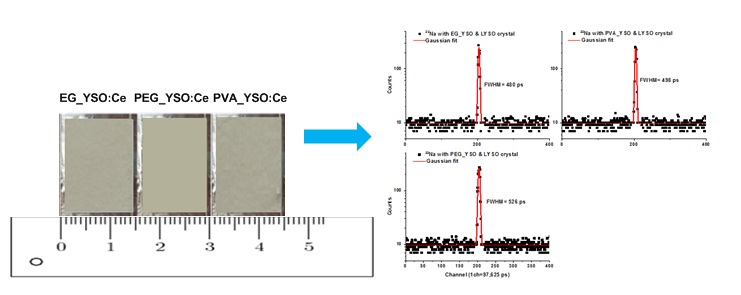Development and characterization of novel fast nanosized scintillator Y2SiO5: Ce3+ prepared by polymer-assisted Sol–Gel method for radiation detection applications
DOI:
https://doi.org/10.57056/ajet.v9i2.184Keywords:
Nuclear instrumentation, Radiation detector, X1-Y2SiO5:Ce3 nanomaterial, Scintillation properties, Coincidence Timing ResolutionAbstract
In this study, three sample detectors were meticulously crafted using cerium-activated X1-Y2SiO5: Ce3+ powder prepared via the monomer and polymer-assisted sol–gel method. The investigation aimed to assess how ethylene glycol (EG) monomer, polyethylene glycol (PEG) polymer, and polyvinyl alcohol (PVA) polymer influence the Coincidence Timing Resolution (CTR) of Ce3+ (xCe = 0.01)-doped Y2SiO5, with the goal to enhance radiation detection technologies. An advanced nuclear instrumentation system was set up to measure the coincidence timing resolution using 511 keV annihilation photons emitted by a 22Na radioactive source. Results showed that complexing agents significantly affected the CTR of YSO: Ce3+ nanoscintillators, with the EG-prepared sample detector exhibiting the most favorable CTR of 480±21 ps. These findings enhance our understanding of YSO: Ce3+ nanoscintillators’ synthesis and optimization, underscoring the pivotal role of the chemical environment and emphasizing the superior performance of ethylene glycol. These insights provide valuable avenues for further advancements in radiation detection and medical imaging applications.
References
Eijk CWE. Inorganic Scintillators in Medical Imaging. Phys Med Biol. 2002;47:R85-106. https://doi.org/10.1088/0031-9155/47/8/201
Dujardin C, Auffray E, Bourret-Courchesne E, et al. Needs, trends, and advances in inorganic scintillators. IEEE Trans Nucl Sci. 2018;65:1977–1997. https://doi.org/10.1109/TNS.2018.2840160
Nikl M, Yoshikawa A. Recent R&D trends in inorganic single-crystal scintillator materials for radiation detection. Adv Opt Mater. 2015;3:1–9. https://doi.org/10.1002/adom.201400571
Lanier RG. Recent Developments in X-ray Imaging Technology.
Gektin A, Korzhik M. Inorganic scintillators for detector systems. Springer. 2017;20–77.
Melcher CL, Schweitzer JS. Cerium-doped Lutetium Oxyorthosilicate: A fast, efficient new scintillator. IEEE Trans Nucl Sci. 1992;39:502–505. https://doi.org/10.1109/23.159655
Cooke DW, McClellan KJ, Bennett BL, et al. Crystal growth and optical characterization of cerium-doped Lu1.8Y0.2SiO5. J Appl Phys. 2000;88:7360–7362. https://doi.org/10.1063/1.1328775
Osiński M, Plumley JB, Withers NJ, et al. Synthesis and characterization of lanthanide halide scintillating nanocrystals for gamma radiation detection. 2010 International Conference on Nanoscience and Nanotechnology. IEEE; 2010. p. 189–192.
Singh S, Singh D. Structural and optical properties of green-emitting Y2SiO5: Tb³⁺ and Gd2SiO5: Tb³⁺ nanoparticles for modern lighting applications. Rare Met. 2021;40:3289–3298.
Li X, Jiao H, Wang X, et al. Y2SiO5: Ce³⁺ particle growth during sol-gel preparation. J Rare Earths. 2010;28:504–508. https://doi.org/10.1016/S1002-0721(09)60141-1
Ghosh P, Sadhu S, Patra A. Preparation and photoluminescence properties of Y2SiO5: Eu³⁺ nanocrystals. Phys Chem Chem Phys. 2006;8:3342–3348. https://doi.org/10.1039/B603273G
Hirai T, Kondo Y. Preparation of Y2SiO5: Ln³⁺ (Ln = Eu, Tb, Sm) and Gd9.33(SiO4)6O2: Ln³⁺ (Ln = Eu, Tb) phosphor fine particles using an emulsion liquid membrane system. J Phys Chem C. 2007;111:168–174. https://doi.org/10.1021/jp064655j
Bokov D, Turki Jalil A, Chupradit S, et al. Nanomaterial by sol-gel method: synthesis and application. Adv Mater Sci Eng. 2021;2021:1–12. https://doi.org/10.1155/2021/5102014
Sharma RK, Ghose R. Synthesis and characterization of nanocrystalline zinc aluminate spinel powder by sol–gel method. Ceram Int. 2014;40:3209–3214. https://doi.org/10.1016/j.ceramint.2013.09.121
Verma N, Kaur J, Dubey V, Dubey N, Ram T. Luminescence properties of Y2SiO5 phosphors: a review. Inorg Chem Commun. 2023;147:110234. https://doi.org/10.1016/j.inoche.2022.110234
Wantong K, Yawai N, Chewpraditkul W, et al. Luminescence and scintillation properties of liquid phase epitaxy grown Y2SiO5: Ce single crystalline films. J Cryst Growth. 2017;468:275–277. https://doi.org/10.1016/j.jcrysgro.2016.12.094
Abuelhia E, Alzimami K, Alkhorayef M, et al. Measurement of coincidence timing resolution of scintillation detectors compared to semiconductor detectors to image three-photon positron annihilation. J Radioanal Nucl Chem. 2008;278:767–771. https://doi.org/10.1007/s10967-008-1608-4
Hamroun MSE, Guerbous L, Bensafi A. Luminescent spectroscopy and structural properties of Ce³⁺-doped low-temperature X1–Y2SiO5 material prepared by polymer-assisted sol–gel method. Appl Phys A Mater Sci Process. 2016;122:1–8. https://doi.org/10.1007/s00339-016-9790-7
Ackermann U, Egger W, Sperr P, Dollinger G. Time- and energy-resolution measurements of BaF2, BC-418, LYSO and CeBr3 scintillators. Nucl Instrum Methods Phys Res Sect A. 2015;786:5–11. https://doi.org/10.1016/j.nima.2015.03.016
Yang Y, Liu C, Mao P, Wang LJ. Upconversion luminescence and photodegradation performances of Pr-doped Y2SiO5 nanomaterials. J Nanomater. 2013;2013:1–7. https://doi.org/10.1155/2013/427370
Zahra B, Guerbous L, Bousbia-Salah H, Boukerika A. Effect of annealing atmospheres on the scintillation properties of Ce³⁺-doped YAG nanoscintillator. Radiat Detect Technol Methods. 2023. https://doi.org/10.1007/s41605-023-00397-x

Downloads
Published
How to Cite
Issue
Section
License
Copyright (c) 2024 Billel Zahra, Lakhdar Guerbous, Mohammed Salah Eddine Hamroun

This work is licensed under a Creative Commons Attribution-NonCommercial 4.0 International License.





